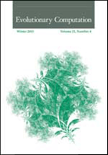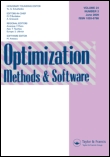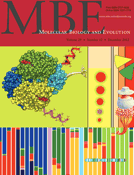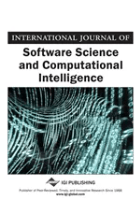
EVOLUTIONARY COMPUTATION
Scope & Guideline
Catalyzing Collaboration in Computational Mathematics
Introduction
Aims and Scopes
- Evolutionary Algorithms and Techniques:
The journal emphasizes the development and refinement of evolutionary algorithms, including genetic algorithms, genetic programming, and evolutionary strategies, highlighting their theoretical underpinnings and practical applications. - Multi-Objective Optimization:
A core area of focus is on multi-objective optimization techniques, which address complex problems requiring simultaneous optimization of multiple conflicting objectives. - Robustness and Adaptability in Algorithms:
Research often explores the robustness of evolutionary algorithms in dynamic and uncertain environments, assessing their adaptability to changing conditions and problem landscapes. - Benchmarking and Performance Analysis:
The journal frequently publishes studies that benchmark evolutionary algorithms against traditional optimization methods, providing insights into their relative performance and efficiency. - Interdisciplinary Applications:
There is a consistent focus on applying evolutionary computation techniques to various fields, including robotics, engineering, biology, and data science, demonstrating the versatility and impact of these algorithms. - Reproducibility and Methodology Standards:
Recent papers indicate a growing emphasis on reproducibility in experimentation and the establishment of robust methodologies for algorithm evaluation.
Trending and Emerging
- Data-Driven and Machine Learning Integration:
There is a growing trend towards integrating evolutionary algorithms with data-driven approaches and machine learning techniques, indicating a shift towards more intelligent and adaptive optimization strategies. - Dynamic and Adaptive Optimization:
Recent publications highlight an increased focus on dynamic and adaptive optimization methodologies, which are essential in environments where problem landscapes can change over time. - Benchmarking and Reproducibility Initiatives:
The journal is increasingly publishing work related to benchmarking platforms and reproducibility standards, reflecting a commitment to improving research quality and reliability in the field. - Evolutionary Robotics and Morphological Adaptation:
Research in evolutionary robotics, particularly concerning the optimization of robot morphology and control, has gained momentum, showcasing the practical applications of evolutionary computation in robotics. - Complex and High-Dimensional Problems:
There is a noticeable increase in studies addressing complex and high-dimensional optimization problems, which are critical in various fields, including engineering and data science.
Declining or Waning
- Traditional Genetic Algorithms:
There is a noticeable decrease in the publication of studies solely focused on traditional genetic algorithms, as researchers increasingly explore hybrid and novel approaches that leverage advancements in machine learning and adaptive strategies. - Basic Theoretical Analyses:
The frequency of papers dedicated to fundamental theoretical analyses of evolutionary algorithms has waned, suggesting a shift towards more applied research and algorithmic innovations. - Single-Objective Optimization Problems:
Research targeting single-objective optimization problems has become less prominent, with a pivot towards multi-objective and complex problem formulations that better reflect real-world challenges.
Similar Journals

OPTIMIZATION METHODS & SOFTWARE
Driving Excellence in Optimization Methods and Theoretical InsightsOPTIMIZATION METHODS & SOFTWARE, published by Taylor & Francis Ltd in the United Kingdom, is a premier journal dedicated to the field of optimization and software development. With an impressive impact factor, this journal maintains a critical role in advancing research in applied mathematics, control, and optimization, as evident from its categorization in the prestigious Q1 quartile for both applied mathematics and control and optimization, and Q2 in software for the year 2023. Over its publication span from 1992 to 2024, it has garnered significant recognition, ranking #116 out of 635 in applied mathematics and #29 out of 130 in control and optimization according to Scopus. The journal provides a platform for innovative research outcomes, theoretical advancements, and novel algorithms that aid researchers, professionals, and students in tackling complex optimization problems. Whether you are looking to disseminate your latest findings or explore cutting-edge methodologies, OPTIMIZATION METHODS & SOFTWARE remains an invaluable resource in the field.

Optimization Letters
Elevating Optimization Science to New HeightsOptimization Letters, published by SPRINGER HEIDELBERG, is a leading journal dedicated to the field of optimization, serving as a platform for high-quality research that spans across mathematics, control, and management disciplines. Based in Germany, this journal has been pivotal in advancing the theory and applications of optimization since its inception in 2007, converging a wide scope of innovative methodologies and practical applications up until 2024. With an impressive Scopus ranking placing it in the Q2 category for both Business, Management and Accounting (miscellaneous) and Control and Optimization, it reflects the journal's commitment to disseminating impactful research. Researchers and practitioners benefit from the journal’s rigorous peer-review process, enhancing its credibility within the academic community. Optimization Letters invites contributions that encapsulate novel findings and methodologies that drive forward the understanding and applications of optimization, making it an invaluable resource for those in related fields.

Algorithms
Driving Discovery in Computational Mathematics.Algorithms is a prestigious and innovative journal published by MDPI, focusing on the rapidly evolving fields of computational mathematics, numerical analysis, and theoretical computer science. Launched in 2008, this open access journal seeks to foster collaboration and knowledge sharing among researchers, professionals, and students by providing a platform for the dissemination of high-quality research articles, reviews, and notes. With its operational base in Basel, Switzerland, Algorithms has steadily established itself in the academic community, achieving commendable rankings such as Q2 in Computational Mathematics and Numerical Analysis, as well as Q3 in Computational Theory and Mathematics and Theoretical Computer Science as of 2023. Furthermore, the journal boasts impressive Scopus rankings, placing it within the top 20% in several categories, underscoring its relevance and influence in the field. As an open access journal, Algorithms ensures that its content is accessible to all, promoting the advancement of algorithmic research and fostering critical discussions that may shape the future of the discipline.

MOLECULAR BIOLOGY AND EVOLUTION
Unraveling Evolution through Molecular InsightsMOLECULAR BIOLOGY AND EVOLUTION, published by Oxford University Press, stands as a premier journal in the fields of molecular biology, evolutionary biology, and genetics. With a proud history dating back to its inception in 1983, the journal spans a convergence period through 2024, providing an exceptional platform for disseminating high-quality research. The journal is recognized in the top Q1 quartile across multiple categories, including Ecology, Evolution, Behavior and Systematics, and Genetics, reflecting its significant impact and relevance in these disciplines. With impressive Scopus rankings—10th in Ecology and Evolution, 12th in Genetics, and 22nd in Molecular Biology—it serves as a vital resource for scholars aiming to stay informed on cutting-edge developments in evolutionary processes and molecular genetics. While it currently does not offer open access, its curated contents resonate well with an audience of researchers, professionals, and students deeply interested in accelerating their understanding of the complexities of life through an evolutionary lens.

Evolutionary Intelligence
Bridging Theory and Practice in Evolving IntelligenceEvolutionary Intelligence is a prestigious journal published by Springer Heidelberg, dedicated to the interdisciplinary study of Artificial Intelligence, Cognitive Neuroscience, Computer Vision, and Mathematics. With its ISSN 1864-5909 and E-ISSN 1864-5917, the journal has established a significant presence in the academic community since its inception in 2008. Spanning a diverse range of topics relevant to both theoretical and empirical research, it has achieved impressive rankings, including Q3 in Artificial Intelligence and Cognitive Neuroscience, and Q2 in Computer Vision and Pattern Recognition as of 2023. With a strong Scopus ranking that places it in the top quartiles of its field, Evolutionary Intelligence serves as an essential platform for scholars and practitioners seeking to advance knowledge and foster innovation in these dynamic fields. Researchers, professionals, and students alike will find invaluable insights and cutting-edge findings that challenge existing paradigms and inspire future explorations in intelligence-related studies.

International Journal of Software Science and Computational Intelligence-IJSSCI
Fostering Innovation in Computational IntelligenceInternational Journal of Software Science and Computational Intelligence (IJSSCI) is a prominent academic journal published by IGI Global, dedicated to advancing the fields of software science and computational intelligence. With its ISSN 1942-9045 and E-ISSN 1942-9037, IJSSCI offers a platform for researchers, practitioners, and students to disseminate innovative research findings, theoretical advancements, and practical applications in areas such as algorithm development, machine learning, and software engineering. Although the journal currently does not operate under an open access model, its rigorous peer-review process ensures high-quality publications that contribute significantly to the academic discourse. Based in Hershey, PA, IJSSCI is recognized for its commitment to fostering collaboration among professionals in the technology and computer science fields, making it an essential resource for those looking to stay at the forefront of software science advancements.

COMPUTATIONAL & APPLIED MATHEMATICS
Fostering Excellence in Applied and Computational MathematicsCOMPUTATIONAL & APPLIED MATHEMATICS, published by SPRINGER HEIDELBERG, serves as a premier platform for the dissemination of high-quality research and advancements in the fields of applied and computational mathematics. With an esteemed reputation bolstered by a Q2 ranking in both Applied Mathematics and Computational Mathematics categories, this journal delivers invaluable insights that cater to the scholarly community, including researchers, professionals, and students. It features rigorous peer-reviewed articles that cover a wide array of mathematical models, numerical algorithms, and their applications across various scientific and engineering domains. The journal has been in circulation since 2003 and remains relevant through its commitment to publishing cutting-edge research until 2024. Though not open access, its impact within the academic landscape is significant, with Scopus rankings placing it in the top quartiles of its fields. Whether you are seeking to stay updated on the latest findings or contribute your own work, COMPUTATIONAL & APPLIED MATHEMATICS is an essential resource for those committed to the advancement of mathematical sciences.

Memetic Computing
Connecting Theory with Practical Applications in Memetic ComputingMemetic Computing is a premier academic journal published by SPRINGER HEIDELBERG, dedicated to advancing research in the interdisciplinary domains of computer science and control optimization. With an impact factor that places it in the prestigious Q1 category for both Computer Science and Control and Optimization as of 2023, Memetic Computing stands at the forefront of innovation, offering researchers, professionals, and students a vital platform to explore and disseminate transformative findings in these rapidly evolving fields. With convergence periods specified from 2009 to 2024, the journal aims to illustrate the synergy between algorithmic and natural systems, reflecting current trends and future trajectories within the scope of memetic algorithms. Its robust Scopus rankings signal its significance as an influential resource within the global academic community. This journal is invaluable for those looking to enhance their understanding and engage with cutting-edge research that blends computational theory with practical applications.

ENGINEERING OPTIMIZATION
Connecting Theory with Practice in EngineeringENGINEERING OPTIMIZATION is a premier academic journal published by Taylor & Francis Ltd that has been at the forefront of the fields of Applied Mathematics, Computer Science Applications, Control and Optimization, Industrial and Manufacturing Engineering, and Management Science and Operations Research since its inception in 1974. With an impressive convergence period extending through 2024 and categorized in the Q2 quartile across various relevant disciplines, this journal is well-regarded for its rigorous peer-reviewed articles that address the latest advancements in optimization methodologies and their applications across industries. With current Scopus rankings placing it in the top percentiles for Applied Mathematics and Control and Optimization, ENGINEERING OPTIMIZATION serves as a vital resource for researchers, professionals, and students alike, dedicated to pushing the boundaries of knowledge and innovation in engineering and related fields. This journal does not offer Open Access; however, it remains accessible through institutional subscriptions and university libraries.

Symmetry-Basel
Unleashing innovation at the intersection of science and mathematics.Symmetry-Basel is an esteemed open-access journal published by MDPI, dedicated to advancing research in the interdisciplinary realms of Chemistry, Computer Science, Mathematics, and Physics. Launched in 2009, this robust platform facilitates the dissemination of cutting-edge studies and innovations, providing unrestricted access to a vast audience of researchers, professionals, and students alike. With an impressive convergence period extending from 2009 to 2024, Symmetry-Basel has rapidly garnered recognition, achieving a Q2 quartile ranking across multiple categories in 2023 and notable Scopus rankings that underscore its academic influence, including a commendable 94th percentile in General Mathematics. Situated in Basel, Switzerland, the journal not only promotes high-quality research but also fosters collaboration and dialogue among various scientific disciplines, thereby enhancing the interconnectedness of these dynamic fields.